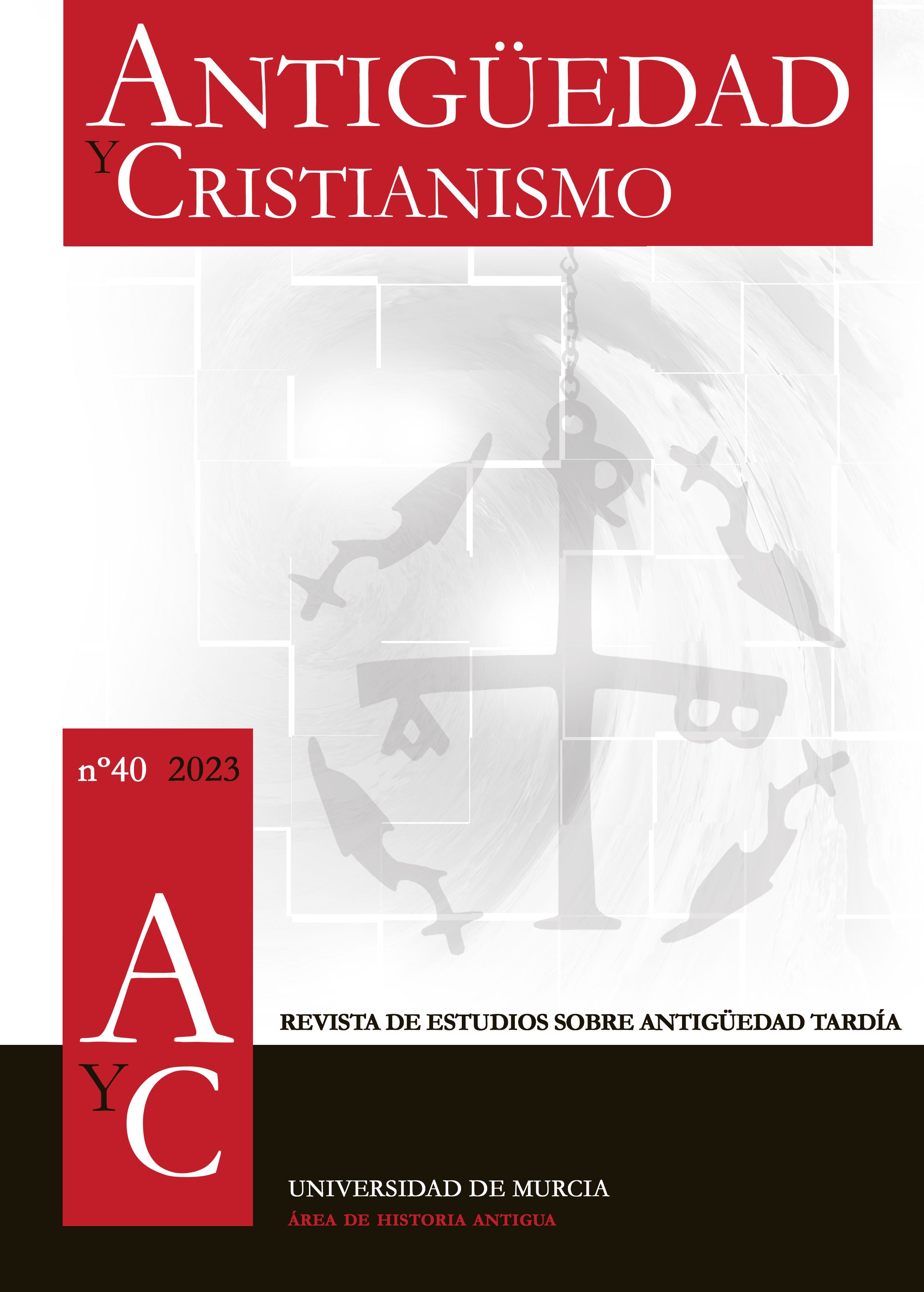The Military Manual as a Cultural Artifact: Vegetius and the Ordering of the Roman Past in the Epitoma Rei Militaris (fourth century AD)
Abstract
Our objective in this article is to point out Vegetius’ Epitoma rei Militaris as a military manual, that is, a type of discourse constructed in Late Antiquity in which the author presents himself as a master of warlike themes, interested in teaching readers and listeners techniques capable of resuming the glorious roman past in the field of martial disputes. From the use of the concept of cyclical time and the elaboration of sets of examples, facts, and mythological and historical characters, Vegetius produced a report that was based on traditional knowledge to guarantee the Romans the return of warlike victories in Late Antiquity.
Downloads
-
Abstract349
-
PDF (Português )234
-
EPUB (Português )56
References
Fontes documentais
Albernaz Lins Silva de Andrade, M. ª C. 2011. Tácito. Germânia. São Paulo: Ed.USP.
Bernabé Pajares, A. 2016. Apiano. Historia Romana. Madrid: Gredos,
Bennet, C. E. 1925. Frontinus. The Stratagems. London: William Heinemann.
Da Gama Kury, M. 1995. Políbio. Histórias. Brasília: Ed. UnB.
Fairclough, H. R. 1916. Virgil Georgics. London: William Heinemann.
Foster, B. O. 1967. Titus Livius. History of Rome. London: William Heinemann.
Manclevist, W. A. 1958. Caesar. The Gallic War. Cambridge: Harvard University Press.
Matos Peixoto, P. 1989. Tito Lívio. História de Roma. São Paulo: PAUMAPE.
Milner, N. P. 2001. Vegetius. Epitome of Military Science. Liverpool: University Press.
Monteiro, J. G. e Braga, J. E. 2009. Vegécio. Compêndio da Arte Militar. Braga-Coimbra: Imprensa da Universidade de Coimbra.
Parton, W. R. 1979. Polybius. Historias. vol. 1-2. London: William Heinemann.
Raquel, V. 2022. Júlio César. Guerras Gálicas. São Paulo: Sílabo.
Paniagua Aguilar, D. 2006. Vegecio. Compendio de Arte Militar. Trad. David Paniagua Aguilar. Madrid: Cátedra.
Reeve, M. D. 2004. Vegetius. Epitoma Rei Militaris. Oxford: Clarendon Press.
Robles Gómez, J. M. ª. 1999. Vegecio. Medicina Veterinaria. Madrid: Gredos.
Scatolin, A. 2015. Salústio. A Conjuração de Catilina. São Paulo: Hedra.
White, H. 1899. Apianus. The Foreign Wars. Nova York: The Macmillan Company.
Obras gerais
Arendt, H. 2016. Entre o Passado e o Futuro. São Paulo: Perspectiva.
Barnes, T. D. 1977. The date of Vegetius. Phoenix 3. 254-257,
Barton, C. A. 2007. The price of peace in Ancient Rome. In: Raaflub, K. A. (Eds), War and Peace in the Ancient World, 245-255. Oxford: Blackwell.
Campbell, B. 1994. The Roman Army. London: Routledge.
Candau, J. 2018. Memória e Identidade. São Paulo: Contexto.
Fernández Ubiña, J. 2000. Cristianos y Militares: La Iglesia Antigua ante el Ejército y la Guerra. Granada: EIRENE.
Formisano, M. 2018. Literature of Knowledge. In: McGill, S. e Watts, E. J. (Eds.), A Companion to Late Antique Literature, 491-504. Hoboken: Wiley Blackwell.
Frighetto, R. 2012. Antiguidade Tardia. Curitiba: Juruá.
Geertz, C. 2008. A Interpretação das Culturas. Rio de Janeiro: LTC.
Goffart, W. 1977. The Date and Purpose of Vegetius’ ‘De Re Militari’. Traditio 33, 65-100.
Goldsworthy, A. 2016. Em Nome de Roma. São Paulo: Planeta do Brasil.
Bravo, G. 1991. Revueltas Internas y Penetraciones Bárbaras en el Imperio. Madrid: Alianza.
Bravo, G. 2023. Roma Antigua. Una Historia Realista. Madrid: Alianza.
Hartog, F. 1996. Regime de Historicidade [Time, History and the Writing of History]. KVHAA Koferenser 37, 95-113.
Hartog, F. 2013. Regimes de Historicidade. Presentismo e Experiências do Tempo. Belo Horizonte: Autêntica.
Hartog, F. 2014. O Espelho de Heródoto. Ensaio sobre a Representação do Outro. Belo Horizonte: Ed. UFMG.
Kershaw, S. 2020. The Enemies of Rome. The Barbarian Rebellion against the Roman Empire. London: Pegasus.
Koselleck, R. 2005. Estratos do Tempo. Estudos sobre História. São Paulo: Contraponto.
Koselleck, R. 2007. Futuro pasado. Contribuição à semântica dos tempos históricos. São Paulo: Contraponto.
Lendon, J. 2005. Soldiers & Ghosts. A History of Battle in Classical Antiquity. New Haven: Yale University Press.
Marcone, A. 2007. Late Roman social relations. In: Cameron, A. e Garnsey, P. (Eds.), The Cambridge Ancient History. Volume XIII, 338-370. Cambridge: Cambridge University Press.
Marrou, H. I. 1990. História da Educação na Antiguidade. São Paulo: EPU.
Matyszak, P. 2013. Os Inimigos de Roma. De Aníbal a Átila, o Huno. São Paulo: Amarilys.
McCall, J. 2002. The Cavalary of the Roman Republic. London: Routledge.
Glare, P. G. W. 1968. Oxford Latin Dictionary. Oxford: University Press.
Paniagua Aguilar, D. 2003.La Epitoma Rei Militaris de Vegecio y el Imperator Invictus. Voces 14, 165-183.
Richardot, P. 1998. La datation du “De Re Militari” de Végèce. Latomus 57 (1), 136-147.
Sahlins, M. 1997. Ilhas de História. Rio de Janeiro: Zahar.
Southern, P. 2006. The Roman Army. A Social and Institutional History. Santa Bárbara: ABC-CLIO.
Tavares, W. J. B. 2021. A questão da Innouatio nos manuais militares romanos tardo-antigos. Relendo o Compêndio da Arte Militar de Vegécio e a obra Sobre os Assuntos Militares (séc. IV d.C.). Tese. Universidade Federal de Goiás.
Veyne, P. 1992. Humanitas: Romanos e Não Romanos. In: Giardina, A. (Ed.), O Homem Romano, 283-302. Lisboa: Presença
Whately, C. 2015. The Genre and Purpose of Military Manuals in Late Antiquity. In: Greatex, G. e Elton, H. (Eds.), Shifting Genres in Late Antiquity, 249-262. Burlington: Ashgate.
Copyright (c) 2023 Wendryll José Bento Tavares, Ana Teresa Marques Gonçalves

This work is licensed under a Creative Commons Attribution-ShareAlike 4.0 International License.
1. The authors non-exclusively assign the exploitation rights (reproduction, distribution, communication and transformation) to the magazine.
2. The works published in this magazine are subject to the Attribution-ShareAlike 4.0 International license (CC By SA 4.0). Therefore, they can be copied, used, disseminated, transmitted and publicly displayed, provided that:
i) the authorship and the original source of its publication (journal, editorial and URL of the work) are cited, thus allowing its recognition.
ii) it is allowed to remix, transform or create from the material while maintaining the same license as the original.
Note: Articles prior to 2022 incorrectly display the CC by SA license in the abstract page. They are under a CC by NC ND license as embedded in the article pdfs. Articles published in 2022 and after are under the CC by SA license.

3. Self-archiving conditions. Authors are allowed and encouraged to electronically disseminate the pre-print (version before being evaluated) and/or post-print (version evaluated and accepted for publication) versions of their works before publication, as it favors their publication. Earlier circulation and diffusion and with it a possible increase in its citation and reach among the academic community. Color RoMEO: verde.
























